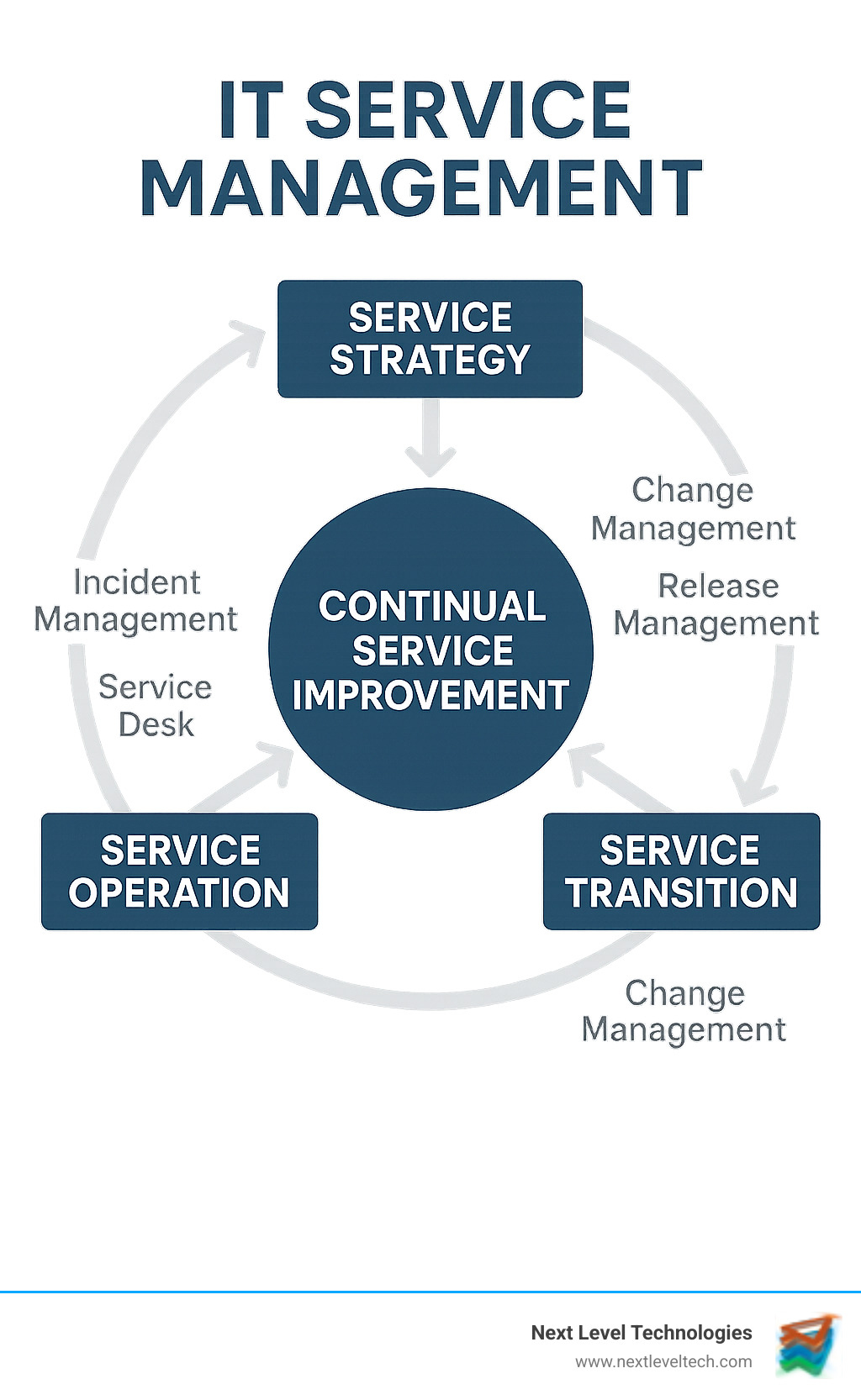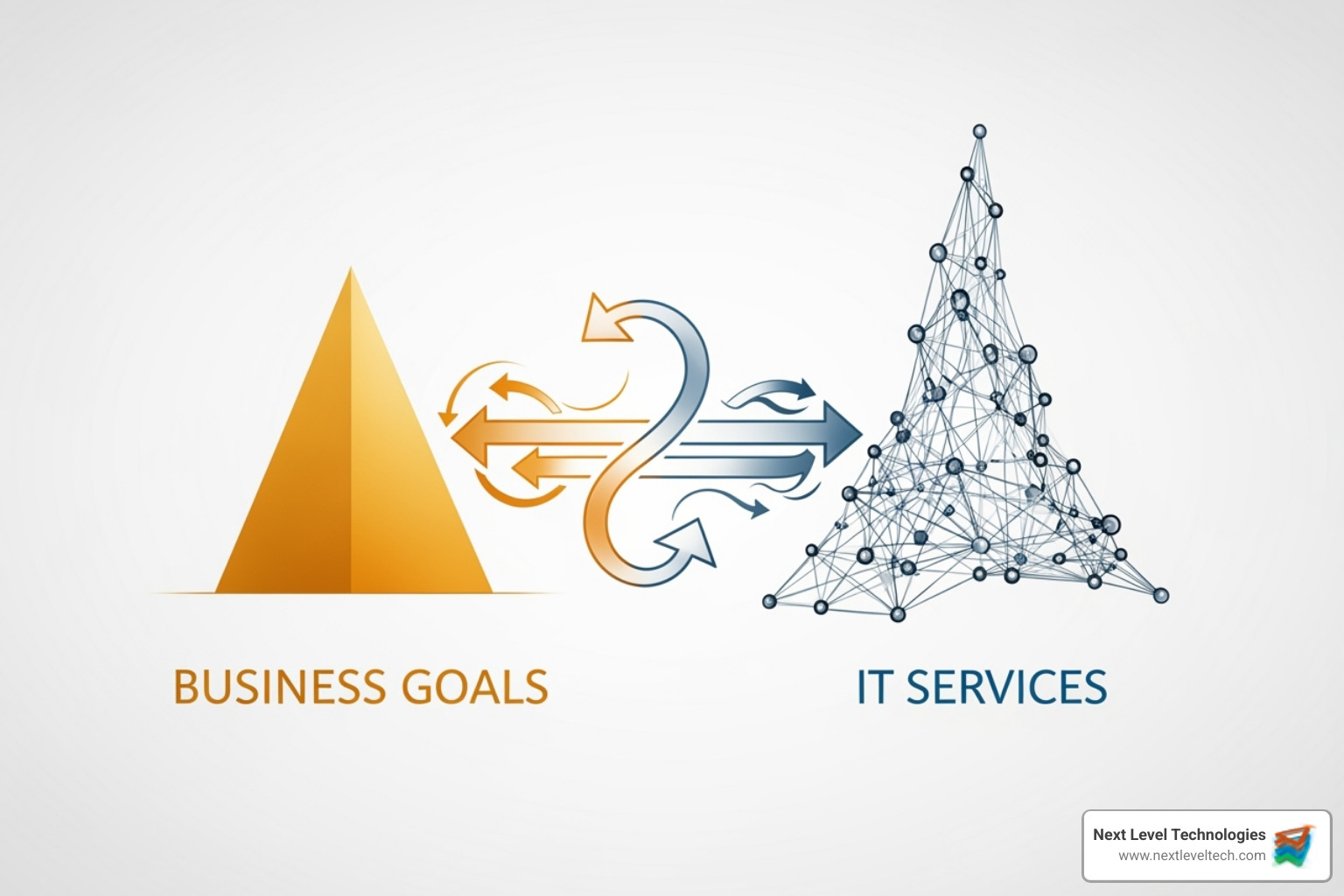The A to Z of IT Service Management
August 8, 2025

Transform your IT! Discover how proactive IT support prevents issues, cuts costs, and secures your business for growth.
February 21, 2026

Discover the benefits of incident management to minimize costly downtime, boost customer trust, and ensure business continuity.
February 19, 2026

Elevate your business with proactive IT Support Charleston WV. Secure, cloud-powered solutions & local expertise for seamless operations.
February 18, 2026
August 8, 2025
Information Technology Service Management (ITSM) is the strategic approach organizations use to design, deliver, manage, and improve IT services. The goal is to align IT with business needs and create value for customers, employees, and stakeholders.
ITSM provides:
This strategic approach shifts IT from a reactive "break-fix" model to a proactive service that drives business value. Instead of being a cost center, IT becomes a strategic asset. As a CIO WaterCooler report noted, businesses use ITSM primarily to improve service quality (48%) and customer experience (35%).
Effective ITSM integrates people, processes, and technology, creating a culture where IT teams understand business priorities and work to ensure organizational success.
I'm Steve Payerle, President of Next Level Technologies. For over 15 years, I've helped businesses in Columbus, Ohio, and Charleston, WV, transform their IT operations. My experience shows that understanding what is information technology service management can revolutionize a business and drive measurable results.

At its core, ITSM transforms your IT department from a reactive repair shop into a proactive service provider. What is information technology service management fundamentally? It's about delivering IT as a reliable service, much like a utility. You expect it to work seamlessly to support your business goals. At Next Level Technologies, we've seen how ITSM bridges the gap between isolated IT functions and overall business strategy for companies in Columbus and Charleston.

ITSM is built on principles that redefine how technology serves your business:
The old "break-fix" cycle is frustrating and inefficient. ITSM changes the dynamic:
The service desk is the command center for your IT operations.
ITSM processes are the gears that make your IT operations run smoothly, while frameworks provide the blueprints. Without this structure, IT can become chaotic and reactive.

These fundamental processes are the daily actions that keep your technology aligned with your business.
Established frameworks provide proven roadmaps for implementing ITSM.
These three concepts are complementary, not competitive.
Successful organizations blend all three. For example, ITIL's structured change management can be accelerated by DevOps automation. Our teams, with their deep technical experience and cybersecurity training, help businesses in Columbus, Worthington, and Charleston integrate these approaches for a unified, future-ready IT strategy.
Business owners in Columbus and Charleston often ask, "Will ITSM actually help my bottom line?" The answer is a definitive yes. Implementing ITSM isn't just an IT upgrade; it's a strategic move that improves how your entire business operates and competes.
ITSM is an investment that pays dividends across your entire organization.
Tracking key metrics proves the value of ITSM and drives continuous improvement.
Digital change is essential for survival, and ITSM provides the stable foundation needed for change. It enables your business to support new technologies like cloud and AI, foster innovation by freeing up IT resources, and align technology investments with strategic goals. By improving the employee and customer experience, ITSM creates a significant competitive advantage. The importance of cybersecurity expertise is critical here; our team ensures every ITSM process is secure from the start, protecting your business as it evolves. At Next Level Technologies, we've seen how proper ITSM implementation helps businesses across Ohio and West Virginia use digital change to pull ahead of the competition.
While processes provide the roadmap for ITSM, it's the skilled people and smart technology that bring it to life, changing strategy into real-world value.
An IT Service Manager is the conductor of the IT orchestra, ensuring services are delivered smoothly and align with business needs. At Next Level Technologies, we value skills that go beyond technical know-how. A great manager needs:
Artificial Intelligence (AI) is revolutionizing what is information technology service management by making it more proactive and efficient. We actively use these advancements to deliver superior service.
The right software automates workflows, provides clear insights, and supports collaboration. When helping clients select a tool, we focus on these key features:
| Feature | Description |
|---|---|
| Ease of Use | An intuitive interface that is easy for both IT staff and end-users to adopt and steer. |
| Scalability | The flexibility to grow with your business and adapt to evolving processes without major overhauls. |
| Collaboration Features | Tools that enable seamless teamwork across IT and other departments to resolve issues efficiently. |
| Automation Capabilities | Robust automation to handle repetitive tasks, process requests, and reduce manual effort. |
| Reporting & Analytics | Comprehensive dashboards that provide clear insights into IT performance for better decision-making. |
| Total Cost of Ownership | A full view of costs—including implementation, training, and maintenance—to ensure a positive ROI. |
Choosing the right software is a critical decision. Our technical experts, leveraging deep cybersecurity experience, guide you to a solution that aligns with your IT strategy and business goals.
When we discuss what is information technology service management with business owners in Columbus and Charleston, a few questions always come up. Here are the answers to the most common ones.
ITIL (Information Technology Infrastructure Library) is the most widely adopted ITSM framework globally. It provides a comprehensive, practical set of best practices for managing IT services. The latest version, ITIL 4, is designed for the modern digital era, focusing on value and collaboration. Our team at Next Level Technologies uses its extensive ITIL and cybersecurity training to implement these best practices securely and effectively.
Absolutely. ITSM is not just for large corporations. It is highly scalable and offers immense value to small and medium-sized businesses by standardizing processes, improving efficiency, and ensuring technology supports growth. ITSM brings predictability to IT operations, helping smaller businesses increase productivity and manage resources effectively without the cost of a large in-house team. Our teams in Columbus and Charleston specialize in implementing enterprise-level ITSM strategies that are affordable and impactful for small businesses.
Not anymore. While ITSM originated in IT, its principles are now applied across entire organizations through Enterprise Service Management (ESM). The same structured workflows that improve IT can also streamline processes in HR, facilities, finance, and customer service. By extending ITSM principles, businesses can create a culture of service excellence that improves efficiency and satisfaction across every department, making it a key concept for all business leaders to understand.
So, we've explored the ins and outs of what is information technology service management, and by now, you probably see it's much more than just fixing computers. It's a powerful, strategic approach that completely transforms your IT from a simple support function into a core driver of real business value. Imagine your technology truly working for you, not just alongside you.
By putting structured processes in place, using powerful frameworks, and always striving for continual improvement, businesses in Columbus, OH, Charleston, WV, and beyond can open up amazing potential. This means boosting productivity across your entire team, cutting down on unnecessary IT costs, and significantly improving the quality of the services you deliver.
At Next Level Technologies, our experienced team specializes in doing just that. We're passionate about implementing robust ITSM strategies that are built to last and designed to meet your unique needs. We also place a strong, strong emphasis on cybersecurity. Our technical experts bring extensive cybersecurity training to the table, ensuring that as we lift your IT operations, we're also safeguarding your valuable data and systems every step of the way.
We truly believe that when your technology is aligned with your strategic goals, your business is unstoppable. Ready to see the difference strategic IT management can make? Let's connect and explore how our comprehensive managed IT services and IT support can take your business to the next level.
Transform your IT! Discover how proactive IT support prevents issues, cuts costs, and secures your business for growth.
February 21, 2026
Discover the benefits of incident management to minimize costly downtime, boost customer trust, and ensure business continuity.
February 19, 2026
Next Level Technologies was founded to provide a better alternative to traditional computer repair and ‘break/fix’ services. Headquartered in Columbus, Ohio since 2009, the company has been helping it’s clients transform their organizations through smart, efficient, and surprisingly cost-effective IT solutions.
